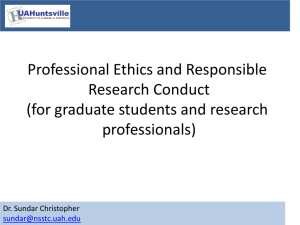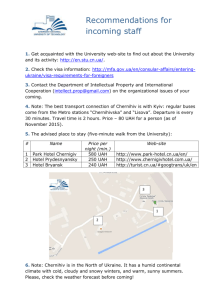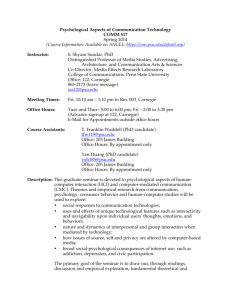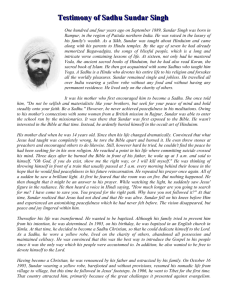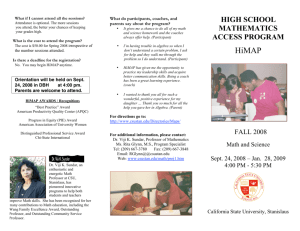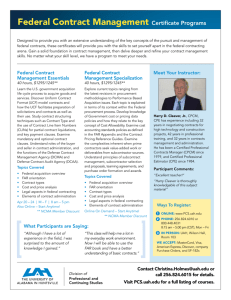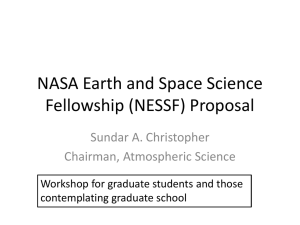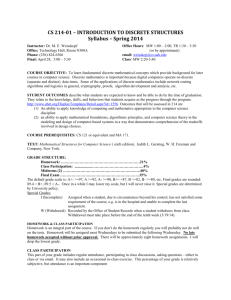Proposal Writing - Sow well now to reap big later!
advertisement
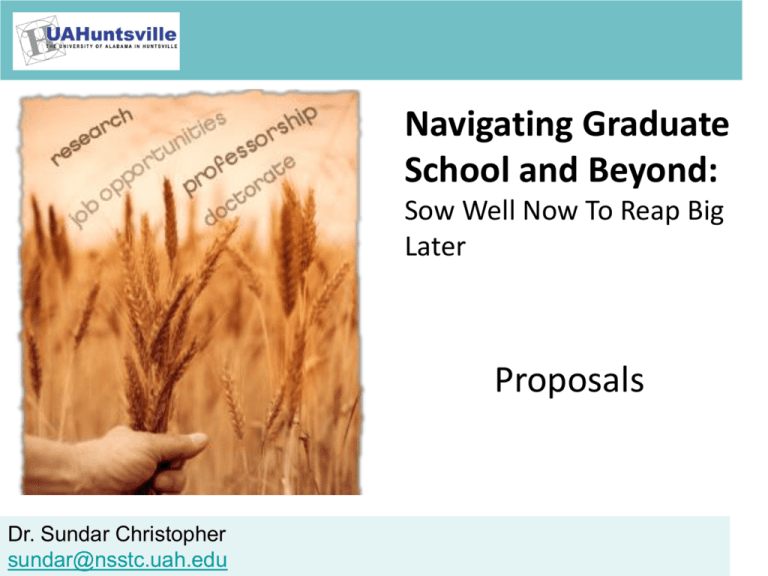
Navigating Graduate School and Beyond: Sow Well Now To Reap Big Later Proposals Dr. Sundar Christopher sundar@nsstc.uah.edu Proposals • • • • • • Why write a proposal Budgets The actual proposal Top 10 do’s for proposal writing Proposal review process Proposal evaluation form Dr. Sundar Christopher sundar@nsstc.uah.edu Why write a proposal • A PhD student must write a proposal for committee before dissertation. Write this proposal to federal guidelines. • Five “golden opportunities” to write and win a proposal through NASA, DoD, and NSF • These proposals must be written within 5 years of graduation • If you win through one agency, you can still submit to another agency Dr. Sundar Christopher sundar@nsstc.uah.edu Types of proposals • Solicited proposal – The agency has a research problem and need to hire scientists to solve the problem. • Unsolicited proposal – Agency has a certain amount of money to use each year for research. No specific problem is identified. Dr. Sundar Christopher sundar@nsstc.uah.edu Grants and contracts • Grant – An agency gives you money to do good research, write quality papers, and stay engaged in your field • Contract – An agency expects deliverables. You must provide a product or body of knowledge. • Grants provide more intellectual freedom Dr. Sundar Christopher sundar@nsstc.uah.edu Request for Proposal (RFP) • Understand all the instructions (number of pages, font size, etc.) • Read the evaluation criteria and make sure each requirement is fulfilled. Highlight key phrases. • Talk to the program manager for details and guidance not have been included in the RFP Dr. Sundar Christopher sundar@nsstc.uah.edu Budgets • Find out how many proposals the funding agency will fund each year. • Determine how much money will be given to each project. • Know how long the project will be funded. • Verify when the money can be expected. • Treat the Office of Sponsored Programs staff properly. • Realize that your first few grants will be small. Dr. Sundar Christopher sundar@nsstc.uah.edu Sample budget Salary – Principal Investigator (3 months) Salary – Grad student (1 year stipend) Grad Student (tuition and benefits) PI, fringe benefits Journal publications (2 per year) Conferences Misc (books and software) Facilities & Administrative (based on 50K subject to F&A) Computer Total Costs Dr. Sundar Christopher sundar@nsstc.uah.edu 15K 18K 5K 4K 4K 2K 2K 25K 10K 85K The Actual Proposal • Realize that only 10-20% of proposals are funded. • Read the RFP and know the requirements • Make sure the proposal idea fits the need of the funding agency • Talk to the program manager Dr. Sundar Christopher sundar@nsstc.uah.edu Tips for selection process • Be aware of funding cycles. Some agencies solicit proposals and some accept proposals throughout the year. • Meet all deadlines including Letter of Intent and full proposal • Follow the agencies format requirements Dr. Sundar Christopher sundar@nsstc.uah.edu Sample proposal outline 1. Cover page a. Name/Address/Signature of PI b.Descriptive title of proposed investigation c. Name(s)/Address(es) of Co-I’s) d.Name/Title/Address/Signature of authorizing institutional representative 2. Summary (abstract) of investigation (1 page) 3. Budget summaries (total for each year) 4. Table of Contents Dr. Sundar Christopher sundar@nsstc.uah.edu Sample proposal outline (cont.) 5. Scientific/Technical section a. Objectives and significance of investigation b.Technical approach and methodology c. Relevance to agency d.Relationship to previous work in field and/or state of the art e.Management plan, including role of Co-I’s f. Timeline of activities (with key milestones) Dr. Sundar Christopher sundar@nsstc.uah.edu Sample proposal outline (cont.) 6. 7. 8. 9. Education/Public outreach effort Curriculum Vitae for each PI and Co-I Detailed budget and management plan Current and pending research support for PI and key Co-I’s 10.Facilities and equipment (both available and needed) 11.Certifications (required by U.S. Code) – Your institution will take care of this Dr. Sundar Christopher sundar@nsstc.uah.edu Sample timeline – Month 1 Segment 1 Segment 2 Segment 3 Read & re-read RFP Write relevance to agency Intro with literature survey Create template Work on hypothesis Write data section Make a checklist Determine sections of all requirements each Co-I will write Compile the literature survey Refine outline Work on budget and help with Co-I’s budgets Finalize budget with OSP Dr. Sundar Christopher Record goals & sundar@nsstc.uah.edu Sample timeline – Month 2 Segment 1 Segment 2 Segment 3 Write methods and technical approach Create graphics – first cut Write project summary/abstract Have a clear path from objectives to methods Have a clear plan of what you have done & what you want to do Refine and finalize graphs Provide first draft to Co-I’s for approval Type set proposal carefully Dr. Sundar Christopher sundar@nsstc.uah.edu Write expected outcomes Write management plan & budget justification Sample timeline – Month 3 Segment 1 Segment 2 Segment 3 Provide a clean copy Read your proposal Finalize proposal to two internal objectively and write reviewers in your down critical issues. organization Speak with your internal reviewers and then modify proposal accordingly Go over checklist carefully Upload proposal Dr. Sundar Christopher sundar@nsstc.uah.edu Tips for writing abstract • Write the abstract last using clear, concise language. • Explain why the project is important • Explain how the project fits the needs of the agency and the RFP. • State the hypothesis and who will benefit. • Mention key data and methods. • Capture your excitement for the project in the abstract. Dr. Sundar Christopher sundar@nsstc.uah.edu Additional tips for proposal • Literature review – Demonstrate knowledge of the state of the art and how this project will progress the field further. • Data – Be sure that data fits the overall scope of the project. • Timeline – Consider how much time will be needed to build instruments needed and allow for this time in the proposal. Dr. Sundar Christopher sundar@nsstc.uah.edu • Mention your understanding of the limitations of your data and methods. • Avoid modesty. Play up your team’s strengths and accomplishments. • Have one overall goal and specific objectives. • Use hypothesis-driven proposal if possible. Make sure hypothesis is meaningful. • Clearly explain methods and correct major flaws. • Explain complex concepts. Dr. Sundar Christopher sundar@nsstc.uah.edu • Use top notch figures with good labels and crisp axes and numbers. • Use appropriate colors in figures. • Explain all terms and break down the physical significance of equations. • Have a management plan and timeline with contingency plan. • Use relevant info and papers in a 1-2 page CV. • Consider your project’s broader impacts on education and outreach. Dr. Sundar Christopher sundar@nsstc.uah.edu Top ten do’s for proposal writing 1. Carefully follow the instructions in the RFP 2. Focus the proposal on a single scientific problem describing the research plan and anticipated results. 3. Provide judicious amounts of tutorial material, especially if proposing innovative work. 4. Give credit to others as appropriate by including references to preceding work in the field. Dr. Sundar Christopher sundar@nsstc.uah.edu 5. Proofread and spell check before submitting. If possible, have a colleague proof the proposal. 6. Keep the proposal text as short as possible without sacrificing completeness. 7. Use clear, easy to read type fonts and page layouts of material. 8. Include all requested information. 9. Strive for realism and adequacy of the budget. 10.Provide any and all material necessary to understand the budget. Dr. Sundar Christopher sundar@nsstc.uah.edu Proposal review process • • • • • Metrics for rating Rating scale Program manager Panel Notifications Dr. Sundar Christopher sundar@nsstc.uah.edu Metrics for rating • • • • • Relevance to agency mission and mandate Technical merit Investigator’s expertise and strength Realism of costs proposed Overall evaluation Dr. Sundar Christopher sundar@nsstc.uah.edu Rating scale • Excellent (5 points) • Very good (4 points) • Good (3 points) • Fair (2 points) • Poor (1 point) • High risk Points and ratings are subjective. Dr. Sundar Christopher sundar@nsstc.uah.edu Program Manager • Looks at ratings and metrics • Considers the amount of money available • Makes a decision or consults with a panel of reviewers Dr. Sundar Christopher sundar@nsstc.uah.edu Panel • • • • • Composed of a superset of reviewers Each proposal is presented by a lead member Panel discusses and debates each proposal Each proposal is rated PM and upper level manager will make final decisions Dr. Sundar Christopher sundar@nsstc.uah.edu Notifications • Happy letter • Read and follow the instructions • Read comments from the reviewers • Contact OSP • Sad letter • Don’t get discouraged • Read the reviews • Make notes about what you would change • Rewrite the proposal and resubmit Dr. Sundar Christopher sundar@nsstc.uah.edu
